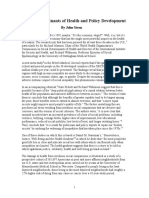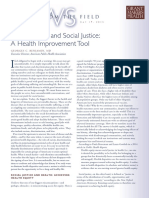Essay Covid 19
Essay Covid 19
Uploaded by
Jessabel AusaCopyright:
Available Formats
Essay Covid 19
Essay Covid 19
Uploaded by
Jessabel AusaOriginal Title
Copyright
Available Formats
Share this document
Did you find this document useful?
Is this content inappropriate?
Copyright:
Available Formats
Essay Covid 19
Essay Covid 19
Uploaded by
Jessabel AusaCopyright:
Available Formats
COVID-19
We have all been affected by the current COVID-19 pandemic. However, the impact of
the pandemic and its consequences are felt differently depending on our status as
individuals and as members of society. While some try to adapt to working online,
homeschooling their children and ordering food via Instacart, others have no choice but
to be exposed to the virus while keeping society functioning. Our different social
identities and the social groups we belong to determine our inclusion within society and,
by extension, our vulnerability to epidemics.
The racially disparate death rate and socioeconomic impact of the COVID-19 pandemic
and the discriminatory enforcement of pandemic-related restrictions stand in stark
contrast to the United States’ commitment to eliminate all forms of racial discrimination.
In 1965, the United States signed the International Convention on the Elimination of All
Forms of Racial Discrimination, which it ratified in 1994. First, we need to keep in mind
that treating people with respect and human dignity is a fundamental obligation, and the
first step in a health crisis. This includes the recognition of the inherent dignity of people,
the right to self-determination, and equality for all individuals. Second, we need to strike
a balance between mitigation strategies and the protection of civil liberties, without
destroying the economy and material support of society, especially as they relate to
minorities and vulnerable populations. Third, long-term solutions require properly
identifying and addressing the underlying obstacles to the fulfillment of the right to
health, particularly as they affect the most vulnerable. For example, we need to design
policies aimed at providing universal health coverage, paid family leave, and sick leave.
Finally, it is important that we collect meaningful, systematic, and disaggregated data by
race, age, gender, and class. Such data are useful not only for promoting public trust
but for understanding the full impact of this pandemic and how different systems of
inequality intersect, affecting the lived experiences of minority groups and beyond.
In 1966, Dr. Martin Luther King Jr. said, “Of all forms of inequality, injustice in health is
the most shocking and inhuman. More than 54 years later, African Americans still suffer
from injustices that are at the basis of income and health disparities. We know from
previous experiences that epidemics place increased demands on scarce resources
and enormous stress on social and economic systems. A deeper understanding of the
social determinants of health in the context of the current crisis, and of the role that
these factors play in mediating the impact of the COVID-19 pandemic on African
Americans’ health outcomes, increases our awareness of the indivisibility of all human
rights and the collective dimension of the right to health.
You might also like
- Critical Sexual Literacy: Forecasting Trends in Sexual Politics, Diversity and PedagogyFrom EverandCritical Sexual Literacy: Forecasting Trends in Sexual Politics, Diversity and PedagogyNo ratings yet
- International VIDEOLETTERS: Learn/View/Document/StudyDocument2 pagesInternational VIDEOLETTERS: Learn/View/Document/StudyAriel DoughertyNo ratings yet
- PandemicDocument2 pagesPandemicAllaine ParkerNo ratings yet
- Informative Essay For COVID 19Document2 pagesInformative Essay For COVID 19Monaliza Gamposilao100% (3)
- Health Equity Through Action On The Social Determinants of Health, "Poor and UnequalDocument2 pagesHealth Equity Through Action On The Social Determinants of Health, "Poor and UnequalMikaela Joy PerezNo ratings yet
- SDG 16 and The PandemicDocument8 pagesSDG 16 and The PandemicArvhie SantosNo ratings yet
- English Expository EssayDocument2 pagesEnglish Expository Essayjixie hwangNo ratings yet
- STUDENT ESSAY The Disproportional Impact of COVID-19 On African AmericansDocument9 pagesSTUDENT ESSAY The Disproportional Impact of COVID-19 On African AmericansPrincis CianoNo ratings yet
- Impact of Covid 19Document3 pagesImpact of Covid 19Balviran SinghNo ratings yet
- The Disproportional Impact of COVID Part 1Document6 pagesThe Disproportional Impact of COVID Part 1blueberryNo ratings yet
- Student Essay The Disproportional Impact of COVID-19 On African AmericansDocument10 pagesStudent Essay The Disproportional Impact of COVID-19 On African AmericansMaria LabroNo ratings yet
- LBTI Caucus Statement in Response To The Covid-19 PandemicDocument5 pagesLBTI Caucus Statement in Response To The Covid-19 PandemicElena VascencoNo ratings yet
- Few Basic Concepts Related To HealthDocument5 pagesFew Basic Concepts Related To Healthkoushi59sshNo ratings yet
- When Misfortune Becomes Injustice: Evolving Human Rights Struggles for Health and Social Equality, Second EditionFrom EverandWhen Misfortune Becomes Injustice: Evolving Human Rights Struggles for Health and Social Equality, Second EditionNo ratings yet
- STUDENT ESSAY The Disproportional Impact of COVID-19 On African AmericansDocument1 pageSTUDENT ESSAY The Disproportional Impact of COVID-19 On African AmericansPrince BatiocoNo ratings yet
- John Paul Article 2Document13 pagesJohn Paul Article 2KikittanNo ratings yet
- Árticulo 2-Pedro A.Document16 pagesÁrticulo 2-Pedro A.omar pascualNo ratings yet
- Ligal LiberalizationDocument10 pagesLigal LiberalizationShashwat SharmaNo ratings yet
- WHO 2019 nCoV SRH Rights 2020.1 Eng PDFDocument4 pagesWHO 2019 nCoV SRH Rights 2020.1 Eng PDFShai F Velasquez-NogoyNo ratings yet
- Sandel TYRANNY of MERIT Search Prologue PDFDocument4 pagesSandel TYRANNY of MERIT Search Prologue PDFOnPointRadio100% (2)
- Pedres, Hanah Bel Y. Bs Entrep2ADocument2 pagesPedres, Hanah Bel Y. Bs Entrep2AHanah Bel PedresNo ratings yet
- My Own Perception of Poverty Question No.1: Poverty Is A Violation of Our Human RightsDocument6 pagesMy Own Perception of Poverty Question No.1: Poverty Is A Violation of Our Human RightsJacob BataquegNo ratings yet
- STUDENT ESSAY The Disproportional Impact of COVID-19 On African AmericansDocument1 pageSTUDENT ESSAY The Disproportional Impact of COVID-19 On African AmericansKisoNo ratings yet
- KKK Covid-19: YOUNG, Patricia Jane IDocument2 pagesKKK Covid-19: YOUNG, Patricia Jane Imarcia1416No ratings yet
- Acquiring To CompeerDocument5 pagesAcquiring To CompeerAbdulAzizMehsudNo ratings yet
- My Contemporary Social ContextDocument5 pagesMy Contemporary Social ContextAndreaNicoleBanzonNo ratings yet
- Ails and Prisons: Nearly 2.2 Million People Are in US Jails and Prisons, The Highest Rate inDocument3 pagesAils and Prisons: Nearly 2.2 Million People Are in US Jails and Prisons, The Highest Rate inRits MonteNo ratings yet
- Courage, Justice, and Practical Wisdom As Key Virtues in The Era of COVID-19Document22 pagesCourage, Justice, and Practical Wisdom As Key Virtues in The Era of COVID-19Kristian Edsel AmaranteNo ratings yet
- Poverty:A Violation of Human Rights or Not?Document12 pagesPoverty:A Violation of Human Rights or Not?Neha JayaramanNo ratings yet
- On Human Dignity AssignmentDocument2 pagesOn Human Dignity AssignmentAnne DerramasNo ratings yet
- Communities in CrisisDocument23 pagesCommunities in CrisisAnna MooreNo ratings yet
- Medical Tyranny: How Covid-19 Has Been Used to Suppress Our FreedomsFrom EverandMedical Tyranny: How Covid-19 Has Been Used to Suppress Our FreedomsNo ratings yet
- It Does Take A VillageDocument5 pagesIt Does Take A VillagedevonchildNo ratings yet
- LDC1101LAD AI Gonzalez XimenaDocument5 pagesLDC1101LAD AI Gonzalez XimenaXimena González AlarcónNo ratings yet
- Reflection Paper On Human RightsDocument3 pagesReflection Paper On Human RightsEmma PataNo ratings yet
- Social Determinants of Health and Policy Development SteenDocument6 pagesSocial Determinants of Health and Policy Development SteenBrayo HeroNo ratings yet
- African American Rescue PlanDocument54 pagesAfrican American Rescue PlanKaylyn ReneeNo ratings yet
- Health Equity Social Justice APHA May 2015Document2 pagesHealth Equity Social Justice APHA May 2015Roe BrionesNo ratings yet
- Article 2 PromiseDocument4 pagesArticle 2 PromiseJasmin Kate Bangco GrampaNo ratings yet
- WHO On Violence Chap1 EngDocument22 pagesWHO On Violence Chap1 Engjorge_campo_59No ratings yet
- Addressing The Impact of COVIDDocument2 pagesAddressing The Impact of COVIDysssa deguzmanNo ratings yet
- Civil Liberties: Protecting Individual Rights and FreedomsFrom EverandCivil Liberties: Protecting Individual Rights and FreedomsNo ratings yet
- A Call For Peoples' Vaccine Against Covid-19 Emmanuel P. FernandezDocument4 pagesA Call For Peoples' Vaccine Against Covid-19 Emmanuel P. FernandezEmman FernandezNo ratings yet
- 20201104_Coronashock-and-Patriarchy_EN_WebDocument71 pages20201104_Coronashock-and-Patriarchy_EN_WebFrancis Ts'otleho MohlekoaNo ratings yet
- Module 6Document11 pagesModule 6Riyan WahyudoNo ratings yet
- Covid 19 Marcos CuetoDocument5 pagesCovid 19 Marcos CuetoAlfredo Sumi ArapaNo ratings yet
- By Lena Simet and Komala Ramachandra and Sarah SaadounDocument11 pagesBy Lena Simet and Komala Ramachandra and Sarah SaadounJohn Renen SecillanoNo ratings yet
- Chapter II-IVDocument11 pagesChapter II-IVJhim CaasiNo ratings yet
- Safeguarding The Rights of Senior Citizens, Especially in LEDCs and Ageing Populations - ECOSOCDocument8 pagesSafeguarding The Rights of Senior Citizens, Especially in LEDCs and Ageing Populations - ECOSOCnatashachaniwa36No ratings yet
- The Covid Conuncture PDFDocument4 pagesThe Covid Conuncture PDFAnamaria Tamayo-DuqueNo ratings yet
- Social Inequality Covid Research Final RevisedDocument10 pagesSocial Inequality Covid Research Final Revisedapi-534361097No ratings yet
- Human Rights and Poverty: Is Poverty A Violation of Human Rights?Document27 pagesHuman Rights and Poverty: Is Poverty A Violation of Human Rights?monali raiNo ratings yet
- Probable Justice: Risk, Insurance, and the Welfare StateFrom EverandProbable Justice: Risk, Insurance, and the Welfare StateNo ratings yet
- Law and Poverty 2 OriginalDocument65 pagesLaw and Poverty 2 OriginalDarshanjot RawalNo ratings yet
- 2020 Community-Innovations enDocument32 pages2020 Community-Innovations enpenaonparasNo ratings yet
- The War On YouthDocument16 pagesThe War On YouthThavam RatnaNo ratings yet
- Chapter 2 Police Livelihood On DrugDocument15 pagesChapter 2 Police Livelihood On DrugRamsax VillasorNo ratings yet
- How Cultural and Social Factors Influence Vaccination in COVID-19-Revised-finalDocument7 pagesHow Cultural and Social Factors Influence Vaccination in COVID-19-Revised-finalSam OdooNo ratings yet
- Homework - ConstiDocument4 pagesHomework - ConstiFrances Joy Gumabol AmangaoNo ratings yet
- Essay About Pandemic 6Document3 pagesEssay About Pandemic 6BONIE JAY DACOTNo ratings yet
- New York City Housing Authority: EEO CASE NO.Document5 pagesNew York City Housing Authority: EEO CASE NO.Michael WarnerNo ratings yet
- Gender Inequality Essay Planning PEEDocument6 pagesGender Inequality Essay Planning PEELuchmee Devi GoorjhunNo ratings yet
- Sogie Bill Position PaperDocument1 pageSogie Bill Position PaperAlyanna Magro100% (3)
- Sociology Unit FiveDocument9 pagesSociology Unit Fiveapi-325580763No ratings yet
- Managing Diversity at Spenser Owens and Co.: AssignmentDocument3 pagesManaging Diversity at Spenser Owens and Co.: AssignmentAnubhav SoodNo ratings yet
- Crisostomo - Luis Dominic - Form Q2 Module 9 UCSPDocument7 pagesCrisostomo - Luis Dominic - Form Q2 Module 9 UCSPLuis Dominic A. CrisostomoNo ratings yet
- A Presentation On Racism From Rachel ShineDocument16 pagesA Presentation On Racism From Rachel ShineMyNorthwest0% (1)
- Unit 6: Gender Equality A. VocabularyDocument3 pagesUnit 6: Gender Equality A. VocabularyHuỳnh Tiến ĐạtNo ratings yet
- Lorenz Curve2Document17 pagesLorenz Curve2HealthEconomics1958No ratings yet
- Municipality of Bulakan Nomination FormDocument1 pageMunicipality of Bulakan Nomination FormPUNONG BARANGAY STA INESNo ratings yet
- Ucsp Week 5: Name: Ashley Dela Cruz Stem 12 JadeDocument2 pagesUcsp Week 5: Name: Ashley Dela Cruz Stem 12 JadeJacqueline Acera Balingit100% (1)
- Mount Kenya University OreroDocument4 pagesMount Kenya University OreroBeehive ProductionsNo ratings yet
- People Like Us OutlineDocument2 pagesPeople Like Us OutlineMichael GuzmánNo ratings yet
- SMILE L.P Q2 UCSP WK 3Document5 pagesSMILE L.P Q2 UCSP WK 3Angelie Espartero Araneta LobitañaNo ratings yet
- What Feeds The Cycle of Institutional BiasesDocument4 pagesWhat Feeds The Cycle of Institutional BiasesJunnineTupazNo ratings yet
- Women in PoliticsDocument6 pagesWomen in PoliticsNegoita ElenaNo ratings yet
- Activity Sheets Week 3 UCSPDocument5 pagesActivity Sheets Week 3 UCSPKristine Eloise JoseNo ratings yet
- No Society Is Free From DiscriminationDocument6 pagesNo Society Is Free From Discriminationprettyginika46No ratings yet
- ესეDocument2 pagesესეdggfrzrjt gfhfjfjfjNo ratings yet
- LearnEnglish Magazine International Womens DayDocument4 pagesLearnEnglish Magazine International Womens DayAamir TalpurNo ratings yet
- Annotated Bibliography - Vanessa MurilloDocument4 pagesAnnotated Bibliography - Vanessa Murilloapi-341348749100% (1)
- Building Defenses Against: DiscriminationDocument8 pagesBuilding Defenses Against: DiscriminationMa. Victoria RamosNo ratings yet
- Concept, Characteristics and Forms of Stratification SystemsDocument47 pagesConcept, Characteristics and Forms of Stratification Systemssoonyoung jeonNo ratings yet
- ReflectionPaper1 AGUSTINDocument1 pageReflectionPaper1 AGUSTINSeth Jarl G. AgustinNo ratings yet
- Activity 2 Social MobilityDocument3 pagesActivity 2 Social Mobilityalexanicolefuerte8No ratings yet
- Gender Inequality in The WorkplaceDocument11 pagesGender Inequality in The WorkplaceLing YiNo ratings yet
- Ucsp q2 Mod6 Socialstratification v2Document23 pagesUcsp q2 Mod6 Socialstratification v2france cruzNo ratings yet
- Dominant and Subordinate Group Analysis Reflection PaperDocument3 pagesDominant and Subordinate Group Analysis Reflection Paperapi-241902257No ratings yet
- Gender Inequality EssayDocument5 pagesGender Inequality EssayJoshua Miguel NaongNo ratings yet

























































































